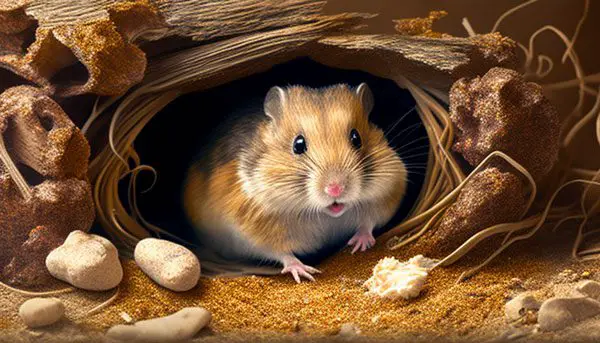Why Is My Hamster Trying to Escape and What Can I Do About It?
Hamsters may try to escape in certain situations. It is a common problem many hamster owners face. However, it can be worrying when your hamster appears determined to leave.
So this may leave you thinking, why is my hamster trying to escape? There could be many reasons, such as feeling threatened, bored, curious, or not having enough space. While there can be other reasons, these are the most common ones.
With that said, we will discuss why your hamster might be trying to escape and provide some advice on handling the situation.
Why Is My Hamster Trying To Escape? 4 Reasons To Look At
Hamsters are obviously cute, but it is hard to predict their intentions. Most of the time, the followings are the reasons for a hamster to leave its cage,

1. The hamster is bored
Hamsters can quickly become bored if they do not have enough activities or toys to keep them stimulated. Thus, a hamster may attempt to flee its home in search of something new and exciting.
2. The hamster needs more space
Hamsters need plenty of room to explore and play. If they feel confined or cramped in their cage, they may try to escape to find a more suitable living space.

3. The hamster is scared
Hamsters are prey animals. They are instinctively scared of loud noises and sudden movements. If a hamster is scared, it may try to escape out of fear or anxiety.
4. The hamster is active and curious
By nature, hamsters are active and curious creatures. They may try to escape to look for adventure or just want to explore their surroundings.
Here is an interesting video of a hamster trying to escape from its cage,
How to Keep Your Hamster from Escaping
If you remain extra careful and take some precautions, you can stop your hamster from escaping. Here are some tips for doing that,

Provide a safe and secure environment
- Assemble a safe environment for your hamster so that he can’t flee.
- Check for any potential weaknesses in the cage, such as gaps in the bars or locks that can be easily picked open.
- Also, make sure the cage is placed away from direct sunlight, drafts, or other animals.
Give your hamster plenty of room
- Hamsters like having plenty of space to roam and explore. Make sure your hamster finds that in its cage.
- You can also add plenty of toys and tunnels to keep it occupied. A bigger cage is preferable for a Syrian hamster.
Give your hamster exercise
Exercise is important for hamsters. This can prevent them from getting restless and trying to run away. Provide your hamster with exercise equipment, such as tubes, ladders, or running wheels.

Stimulate your hamster mentally
Hamsters need to be mentally stimulated to keep them from getting bored. Try petting two or more hamsters at once rather than just one. This will prevent the hamsters from becoming lonely and attempting to flee.
Be vigilant
Even if you do all of the above, it is still important to stay vigilant and watch for signs that your hamster is attempting to escape.
If you notice any behavior that indicates your hamster is trying to get out of his cage, take action immediately by reinforcing the cage or finding another solution. A female hamster will require extra attention.
What to Do If Your Hamster Escapes

If your hamster does manage to escape, don’t panic.
- The first step is to inspect the area for possible exit points.
- Make sure you have sealed any potential gaps and holes that could have allowed your hamster to escape.
- Start searching immediately if you can’t find your pet in those gaps or holes.
- When searching, make sure to check all of the places a hamster might hide. Some popular places might be behind furniture, in closets, under beds and tables, etc.
- Look for places where your hamster might be able to look for food.
- Use treats or their favorite food to lure them out if you have to.
- If you still can’t find them, set up humane traps around the house or in the yard. Set up baits by leaving food in those traps. Once you set up the trap, keep an eye out.
- If everything else fails, contact a local animal shelter or an animal rescue organization. They may be able to help you find your pet.
Note
Be cautious while searching for a hamster that has escaped. Stay calm and move slowly so that you don’t scare them away. After finding your hamster, take it to the vet for a check-up if necessary.
If you’re concerned about your hamster’s well-being, you may find our articles on why your hamster is sleeping so much and why your hamster is not eating and drinking useful. Our article on why your hamster is sleeping so much explores the potential reasons why your hamster might be napping more than usual and when it might be a cause for concern. Meanwhile, our article on why your hamster is not eating and drinking discusses the possible reasons behind this behavior and what you can do to help your hamster.FAQs
To clear off some thoughts, we have answered some related questions below.
Q: Does a hamster typically run away?
Yes. It is a habitual fact for hamsters to escape. In fact, they are very good at escaping. Their escaping isn’t related to how you take care of them. Additionally, they will be desperate to escape when they feel threatened or confined.
Q: Do hamsters that go away return home?
It is difficult to predict whether a hamster that has escaped will return home or not. It depends on the individual hamster and the environment. Some hamsters may find their way back, while others may become lost or taken in by someone else.
Q: Which form of exercise benefits hamsters the most?
If you provide a hamster with a way to exercise, it will do so. The finest exercise compared to other options is hanging a string from the cage’s top. This will promote their climbing and movement.
Conclusion
If your hamster is trying to escape, you need to find out why it feels uncomfortable in its home. Once you find the reason, make the necessary changes to keep them happy. Make sure their cage has plenty of space, amenities, as well as chewable items.
Likewise, if you follow the suggestions we described, you can be certain that your hamster feels safe in its home and doesn’t try to escape.




